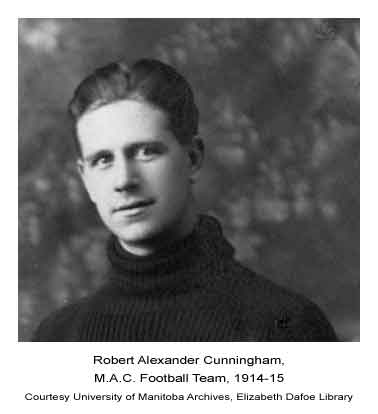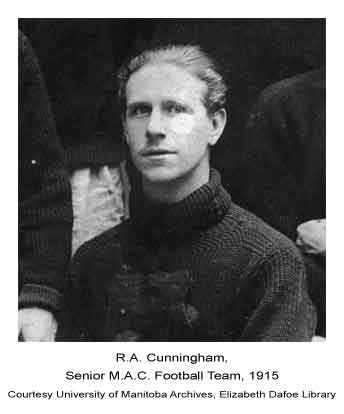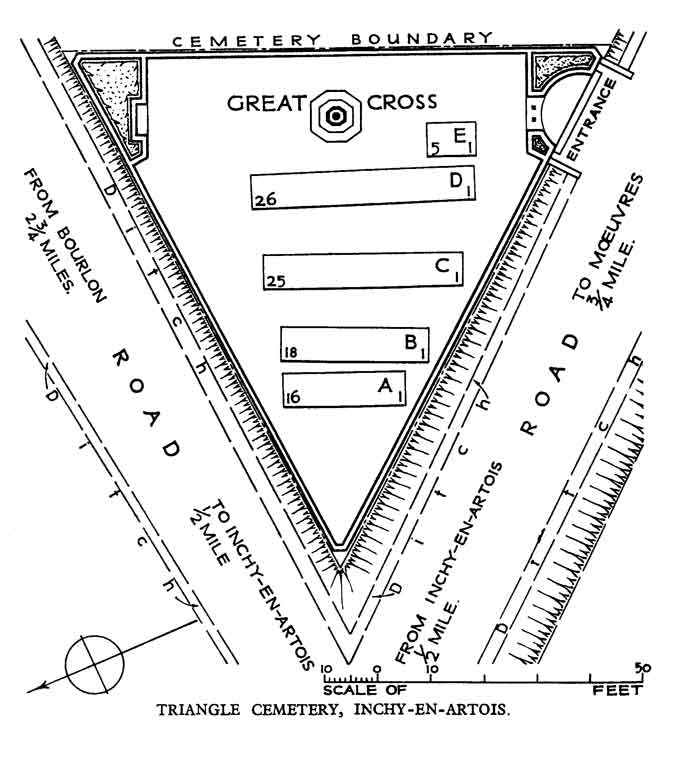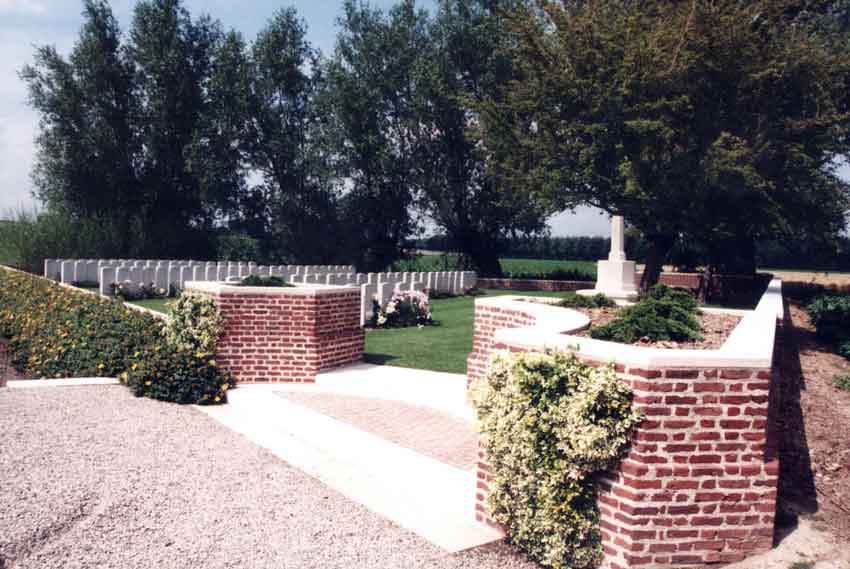

SSNS Home > Senior Years > Curricula 9-12 > Grade 11 > Canadian History > Remembrance Day > MAC Soldiers > Cunningham
 |
 |
Cunningham, Robert Alexander, B.Sc. (Edin.), Lecturer in Chemistry (Agric.) at Manitoba Agricultural College. Military Service: Lieutenant, Platoon Commander, 196th University Corps., 46th Bn., Attestation Papers. Diary Reference: “[The judges, Miss L. R. Brown and Messrs. R. A. Cunningham and E. J. Trott, decided in favour of the affirmative, in spite of the evident debating ability of Miss Rathwell.],” 1:11 Dec ’14; “Neither [C. R.] Hopper nor [R. A.] Cunningham have enlisted yet. It seems to me that those fellows who talked the most about enlisting are doing the least,” 1:24 May ’15.
Additional Biographical Information:
1917
Member of Staff, Lieut. R. A. Cunningham, 196th Univ. Batt.
University of Manitoba, Archives and Special Collections, Managra, v. XI, No. 1 (Nov 1917), 6.
Platoon Commander, [196th] University Corps.
University of Manitoba, Archives and Special Collections, M.A.C. Gazette, v. IX, no. 5 (Mar. 1917), 62.
Lieut. R. A. Cunningham
15 Res. Base, Bramshott, Dec 9th, 1917.
My Dear Jackson:
I was very pleased indeed to receive a letter from you a short time ago, and I regret not having answered it sooner. Never since coming to England have I been so busy; and Sunday is about the only day I have to myself.
Following the big scrap in the Ypres salient, we were called upon to furnish large drafts of men and officers. The training of all ranks in auto gas work is checked at the Base, so I had my hands full getting the men up to a high pitch of training. In addition, every person going to France takes his gas mask with him, and this makes it necessary to have the fitting done on this side. It is a very prolonged operation, but too much care can’t be exercised in seeing that a man gets a good fit. The rush has died down now, but I’m going ahead with the fitting so as to be ready when the next calls come. Of course that won’t be until after every soldier has polled his vote. We can’t afford to lose any Union votes.
In addition to my military duties during the day, I’m engaged in Agricultural work in the evenings. As a result of Dr. Torries’ visit to England, educational work has been started in all the camp areas, here and in France. The concern is known as the Soldiers’ College, and classes are provided in Classics, History, English, Engineering, French, Business Correspondence and Agriculture. At first I was assisting in the 1st mentioned department, but the Dean was ordered away and I was ordered from London to take the work over from him. Since then I have developed the course and have several assistants, amongst whom is Sergt. A. Robertson, who is looking after the dairying. As my portion, I have soils and Animal Husbandry. The lecturer in Horticulture and Field Husbandry has been ordered to France and I’m taking over the last mentioned subject. I’m very sorry to lose him, as he is an O.A.C. [Ontario Agricultural College] graduate of ’15 and a splendid Horticulturist. The chief trouble lies in getting and keeping instructors. I have had to go back to my college days for strength and support in my work. At first I merely joined in to give a helping hand, but London decreed that I should be set aside exclusively for that work. This meant giving up my anti-gas work, which I very strongly resented doing, and I am being permitted to carry on both.
One is reminded very forcibly of the fact that when you join the army you lose all freedom of action and are blown hither and thither. It seems as if, the harder I try to get to France, the further I seem to be from getting there. I have this one consoling fact, that when free from educational work I’m going to France as a gas officer.
Just to complicate matters a little more, a signal message came through ordering me to be ready to proceed at short notice to the Ministry of Munitions. As I couldn’t be in two places at once, I let the authorities find it out, with the result that I have to stay here. It is rather curious that if I had gone I was to go to Derby to work with Dr. Morden. He expected me and I could have had a good salary in addition to my military pay, but I would have grown very restless and been definitely shut out from France. The decision was to my liking.
Talking of old associates, when in London last week-end at a gas conference, I had the pleasure of meeting Walter Crawford and Henry Dennison. I could see no difference in Walter. He is in the R.F.C. [Royal Flying Corps] now, qualifying for his pilot’s certificate. He is full of stories of his many experiences in France, where he did splendid work. His Military medal looks well placed on his breast. We didn’t have very long together as I had a train to catch, but he is coming over here to see me.
Henry Dennison is doing good work with the 2nd Division in France. He is home on leave, and quite happy with his lot. He had hoped for the opportunity to visit the Grand Fleet, but that fell through and he chose the next best thing – a trip to Scotland.
As for the M.A.C. boys, I haven’t had any letters for some time, but those with the 5th Div. M.G. Coys. [machine gun companies] were over near here firing and I saw one or two of them. The boys in France are keeping out of the casualty lists in fine manner. I heard from Booth that he had received a parcel from the M.A.C. Red Cross, so that would indicate that these Xmas gifts have crossed without any mishap. Parcels have started to arrive thus early.
There is quite a bit of excitement over here concerning the election issue, but there is no doubt which way the soldiers are voting. If the folks back home are true to the boys over here there can be no doubt as to the issue. If Laurier gets in, rather than return to Canada, I’ll transfer to the Imperials.
We are all quite depressed over the Halifax disaster, the worst thing that has befallen Canada for years. I hope the newspaper reports are exaggerated and that the loss of life is not nearly so high as stated. It will be a sad Xmas time in many homes there.
Mrs. Cunningham is well and enjoying the lovely fall weather. Today is wet and windy, but November was a glorious month.
Convey my Xmas greetings to Mrs. Jackson and Jean, to the other members of the staff and to the students. Best wishes for the New Year, with the hope that we will meet again ere its close.
From yours sincerely, R. A. Cunningham
University of Manitoba, Archives and Special Collections, Managra, v. XI, No. 3, (Jan. 1918), 35-36.
1919
France
Sept 22nd, 1918
Killed Sept 27th
Extract from letter received from Lieut. R. A. Cunningham.
My Dear Jackson:
When one is situated where desolation reigns; where civilization seems to have stepped out and given place to Chaos, it is hardly possible to have a settled feeling, and, above all, a desire to write. What one has, or at least what I have experienced is the impulse to try and see beyond the present state of things and ponder over the outcome of it all; and the thought comes up that Justice, in full measure, must be meted out to those who have made a wilderness of what was once a smiling countryside. Today I had, in course of duty, to walk through a shell-torn area, where some of the bloodiest fighting of this war has taken place, and, amid the desolation that prevails, where villages are but heaps of dust and trees are shorn of all foliage or broken over, it was still possible to imagine what had been the beauty of the place. There, in the strands of wire blighting the surface, one can see the wild flowers in bloom, suggesting in their appearance that nature will again restore those areas to their former states.
My work at Bramshott has given me a splendid introduction to the Battalion, for I had met nearly all the officers and a large proportion of the men before coming here. I got a good welcome, and have as brother officers about ten others all from the 196th Battalion. Most of them came here as other ranks from Saskatchewan and B.C. The Battalion, so far as its officers [and] personnel is concerned, is fast becoming a second edition of the 196th.
The Battalion has been out on rest since I joined it, but things won’t always be that way. The boys have seen some hard fighting in this connection, the Military Service men have shown up wonderfully well. They need a rest and are surely enjoying it. The morale of the troops could not be better, and is very much in contrast with that of the Hun at the present time. In the last fighting our boys found that the German officers and N.C.O.’s did all the fighting. We got evidence of Hun troops being shot by their officers, and of men being whipped into action. While the end of all this bloodshed is not in sight, we are perhaps nearer than we actually think. When troops strike and get what they want every time, as our boys have been doing for two months, the effect on the enemy is bound to be demoralizing. He has offered to evacuate Belgium, but only because he knows that before long he will have to get out.
Signed
R. A. Cunningham
University of Manitoba, Archives and Special Collections, Managra, v. XII, No. 1 (Jan. 1919),13.
1923
Cunningham, Robert Alexander: B.Sc. (Edin.); Lecturer Chemistry (Agric.) Man. Agric. College; Enlisted 20-2-16; Lieut. 196th Univ. Bn.; Transferred to 46th Bn.; Service in France; Killed in Action 27-9-18.
University of Manitoba, Roll of Honour 1914-1918 (Winnipeg: University of Manitoba, 1923), 56. (Plate L).
Date of death: 27 September 1918. See casualty details, Canadian War Graves Commission. Buried at Triangle Cemetery, Inchy-En-Artois, Pas de Calais, France. Grave reference: D. 19.

